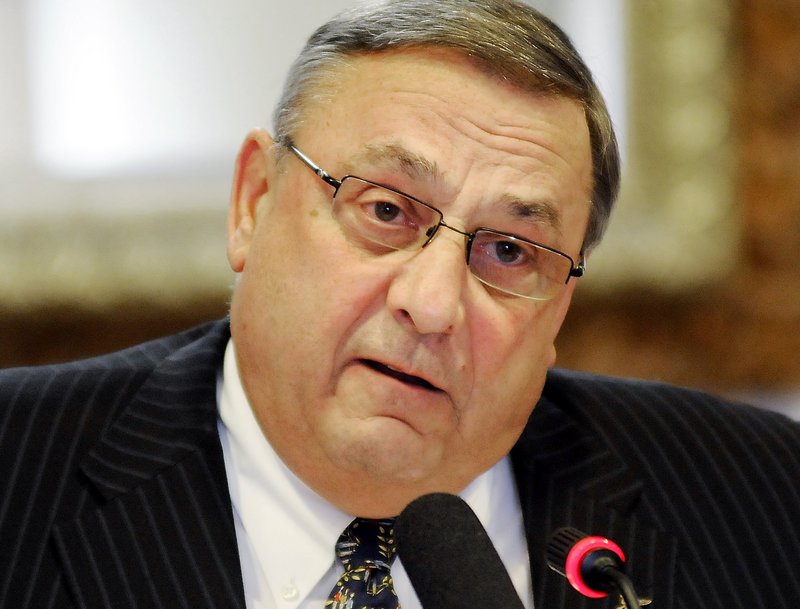AUGUSTA – Sitting in an F-35 cockpit simulator, Gov. Paul LePage joked during a photo op this month that he wanted to bomb the Portland Press Herald for its reporting on his administration. It turns out it’s LePage who has a target on his back as perhaps one of the nation’s most vulnerable Republican governors in the upcoming election.
LePage’s off-color remarks have offended opponents, galvanized supporters and fueled attacks from the Democratic congressman and independent candidate hoping to unseat him in 2014. But the three-way race shaping up may once again play into LePage’s favor.
Being blunt doesn’t seem to hurt New Jersey Republican Gov. Chris Christie, who is up for re-election this year and is a strong favorite to win his race, but LePage’s coarser remarks make him probably the most ripe for defeat, said Ross Baker, a political science professor at Rutgers University who has served as a senior adviser to Democrats and a Republican in Congress.
“You have a situation in which you’ve got a candidate who has real vulnerabilities, real shortcomings, widely perceived,” he said about LePage, who came into office with tea party support in 2010. “Even mainstream Republicans would recoil at some of the things that Gov. LePage said.”
In June, just moments after announcing his intention to veto the state budget because it included tax increases, LePage used a sexually vulgar phrase to describe how he believed a Democratic lawmaker was talking advantage of the people.
He’s told the Portland branch of the NAACP to “kiss my butt,” compared the Internal Revenue Service to the Gestapo and said he’d be telling President Barack Obama to “go to hell.”
This past week, the Press Herald, citing unnamed attendees of a private fundraiser, reported that LePage said Obama “hates white people.” Others who were there told the newspaper they didn’t hear such remarks, and the governor on Tuesday denied making the comment.
Late Friday, LePage sent Republicans a statement apologizing “for any difficulty that remarks recently reported in the press may have caused you.” He did not deny making the comment but said in the statement he does not believe that Obama dislikes any racial group.
LePage won with just more than 38 percent of the vote in 2010, barely edging out independent candidate Eliot Cutler in a three-person race. LePage again faces divided opposition in Cutler and Democratic U.S. Rep. Mike Michaud. And splitting the anti-LePage vote is the governor’s best chance at re-election, analysts say.
Even his critics say it would be a mistake to underestimate LePage.
LePage’s opponents hope that progressive support coalesces behind one candidate, and a liberal-leaning consumer group, the Maine People’s Alliance, recently urged voters to back Michaud to prevent a replay of 2010.
But Cutler maintains a strong following and Maine’s largest voting bloc is unenrolled voters.
“There will be a sizable bloc of anti-LePage voters, but they won’t be able to agree which candidate is the best to win in the end,” said Dan Demeritt, a political consultant and former LePage spokesman.
The governor’s comments have done little to deter his loyal core of supporters, who embrace his willingness to speak his mind. Still, LePage opponents have capitalized on his abrasive style, bashing LePage for the negative attention he has brought to Maine.
“Personal and political attacks are standing in the way of progress,” Michaud told supporters when he officially announced his candidacy on Aug. 15. “Our state has become a punchline on late night TV.”
Brent Littlefield, LePage’s senior political adviser, said Maine residents view LePage’s blunt remarks in light of his tough upbringing — he was homeless as a child — and the difficult situation he faces working with a Democratic-controlled Legislature that LePage believes is pushing policies that are bad for Maine.
“They recognize that and yet even though he may not be their view of how an elected official would normally talk, they support his policies and they support the change that he is trying to make,” Littlefield said.
LePage has lowered taxes for two-thirds of Maine taxpayers, eliminated $1.7 billion of the state pension system shortfall, and passed a plan to repay the state’s hospitals more than $400 million in Medicaid services.
But while LePage supporters generally embrace his approach, even a small group of voters fleeing LePage’s camp could hurt him, said Sandy Maisel, political science professor at Colby College in Waterville. “His comments give people a reason to vote against him who might otherwise give him the benefit of the doubt,” Maisel said.
Send questions/comments to the editors.



Comments are no longer available on this story